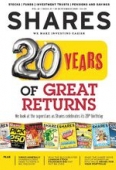Archived article
Please note that tax, investment, pension and ISA rules can change and the information and any views contained in this article may now be inaccurate.
Is the EU turning Japanese?

Outgoing European Central Bank (ECB) president Mario Draghi talked a big game over the summer that only served to ratchet up the expectations of financial markets greedy for more cheap cash.
In the end, Draghi provided a 10 basis point (0.1%) cut in the deposit rate to -0.5%, charging banks more to park their cash with the ECB, in an attempt to get them to lend. He also resumed quantitative easing (QE) where the ECB sanctioned a €20bn-a-month programme, without any time limit.
Market reaction was initially muted. Bond prices fell as yields increased, equity markets did little and the euro went up against the dollar.
This is the opposite of what Draghi would have wanted to happen and suggests that faith in his policies has begun to ebb.
The EU’s economy has proved able to stand on its own two feet for barely nine months, as it was only last December that the ECB stopped adding to QE.
MORE TO DO
An inflation rate of 1% is way below the 2% target and economic growth across the EU is still anaemic – the ECB cut its forecasts again, alongside Draghi’s policy announcement. The euro has lost 10% of its value against the dollar, even if it has gained 14% against the pound since the ECB president first swore he would do ‘whatever it takes’ to defend the single currency on 26 July 2012.
Even European share prices seem unconvinced, which must be particularly galling for an ECB president who once said that the first thing he looked at in the morning was stock markets.
Yes, the Euro Stoxx index is up by 75% since Draghi’s infamous commitment to the euro. But at 383 the benchmark equity index is no higher now than it was in December 1999 and the Euro Stoxx banks index is back at 1993 levels.
This has very uncomfortable echoes of the ‘lost decades’ suffered by Japan since the bursting of its debt-fuelled property and stock market bubble in 1989.
Draghi can hardly be held responsible for the overbanked nature of many European markets, the fragmented state of the EU bank industry (which means too many players lack scale) or bank bosses’ reluctance – or inability – to clean up their balance sheets and tackle non-performing loans as ruthlessly as the Americans did a decade ago.
But the slide of the banking index is a concern and even Draghi himself seems to be finally recognising that his negative interest rate policy and QE may be doing as much damage as harm. Perhaps in response, last week he moved to exempt some of European banks’ excess reserves from the -0.5% deposit rate.
The ECB wants banks to lend. But by charging them -0.5% on their excess reserves, the central bank is compressing margins and eroding capital bases, limiting banks’ ability and desire to lend. By contrast the US Federal Reserve is still paying interest to American banks on their excess reserves, helping to support margins, buttress capital bases and facilitate lending.
CHEAP AT THE PRICE?
It is easy to paint a gloomy picture. But some investors may take the view that little or none of this constitutes news and that if an index is where it was 20 years ago there may be some contrarian value to be had.
The good news is that European stocks trade at a discount to their global peers, although less encouragingly this is not unusual if you look back over time, especially relative to the all-conquering US equity market.
Data from Bloomberg suggests the Euro Stoxx is cheap relative to its own history on an earnings and dividend yield basis. That may tempt some but it also begs the issue of what will prompt investors to reappraise Western Europe as a portfolio option.
A settlement to the vexed issue of Brexit is one possibility but that would still leave the EU facing fractious regional political issues in Belgium, Spain and Italy to name but three.
Some improved economic momentum would be very helpful, if the bloc is to really shake off the ‘Japanification’ tag, especially as that would also soothe unhappy electorates.
Time-pressed investors are hardly short of indicators when it comes to the EU’s economic health but this column’s favourite remains Belgium’s Courbe Synthétique.
For whatever reason the survey of several thousand Belgian industrials has an uncanny long-term link with the Stoxx Europe index and even if the past is no guarantee for the future it will be worth watching. The next monthly survey result is due on 24 September.
Important information:
These articles are provided by Shares magazine which is published by AJ Bell Media, a part of AJ Bell. Shares is not written by AJ Bell.
Shares is provided for your general information and use and is not a personal recommendation to invest. It is not intended to be relied upon by you in making or not making any investment decisions. The investments referred to in these articles will not be suitable for all investors. If in doubt please seek appropriate independent financial advice.
Investors acting on the information in these articles do so at their own risk and AJ Bell Media and its staff do not accept liability for losses suffered by investors as a result of their investment decisions.

 magazine
magazine












